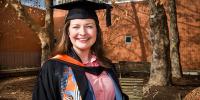
Hannah Dawson by James Walsh
Master act
Comparing travel with a carton of eggs is an unusual way to describe what happens when people venture outside their comfort zone.
Crawford School of Public Policy scholar Hannah Dawson devised the metaphor, after travelling through Europe, Canada and South America.
The carton is a metaphor for home.
“You can be scrambled, whisked away, hard boiled. But at some stage after you leave the carton, you’ll crack,” she says.
She remains an avid traveller, nonetheless.
“If you never leave the carton, you’ll rot. You just have to hope you’ll end up sunny-side up.”
The Master of Public Policy graduate was chosen to speak at the ANU College of Asia and the Pacific graduation ceremony on 18 July.
At 28, she’s travelled far and wide enough, and learned enough life lessons along the way, to offer a plethora of wise insights.
During her gap year in 2005, she taught English to blind and partially sighted students at a Polish boarding school, backpacked through Eastern Europe and worked as an au pair in the United Kingdom.
Reluctant to return to the cares and pressures of home, she was tempted to stay right where she was.
But words from her mother, received via a red British phone box from halfway around the world, changed her mind.
“She said ‘Hannah, please come home and get an education,” she recalls.
Hannah had deferred a degree that would allow her to pursue her interest in environmental law – an offer that was soon to expire, she was reminded.
No one else in her family had been to university – her mother, a former ballet dancer, didn’t want to see her throw the opportunity away, and she knew her great-grandfather, Jimmie Barker, had also recognised the value of education. In 1912, a teacher at the Brewarrina Aboriginal Mission in NSW, where he was a student, told him that Australian Aboriginal people were ‘the lowest type of humanity and not worth teaching.’ The then-12-year-old boy responded by learning to read within two months, relying on old newspapers, jam tin labels and anything else he could find to aid his progress.
“He had this insatiable appetite to learn. He should have been an engineer. He figured out how to make a propeller boat without having seen one before, despite the lack of teaching instruction. He persevered. He saw the importance of education.”
At the time of the phone conversation with her mother, Hannah was working in catering.
“I had the option of washing dishes or taking up a law degree,” she laughs.
Taking her mother’s advice, within six weeks she had returned to Sydney to commence a combined arts/law degree at Macquarie University.
She didn’t stop there. She went on to complete a Graduate Diploma in Legal Practice at ANU in 2013, and will graduate with a Master of Public Policy from the university this week.
Along the way she secured a cadetship with the Department of the Environment, where she initially worked during university holidays while completing her undergraduate qualification. The cadetship led to full-time roles in the department’s Wildlife, Heritage and Marine division.
She is now studying how unconscious biases affect the retention of Indigenous Australians in the Australian Public Service. The Aurora Project research is being conducted through the ANU’s Centre for Aboriginal Economic Policy Research.
It’s an area close to home. While grateful for the financial assistance she received through several Indigenous scholarships, she often questioned whether she was a worthy recipient.
In addition, a battle with depression, combined with the pressures of being a law student, saw her admitted to a Sydney clinic in 2008
“When you’re in high school, you’re told ‘you’re the best.’ And then you get into law, and you think, ‘everyone here is the best,’” she says.
With the same determination as great-grandfather Jimmie Barker, she persevered, reminding herself what drove her interests.
“I’ve always had a passion for public policy,” she says. “As a little kid, my parents were flabbergasted when I wanted to watch the news instead of Teenage Mutant Nijna Turtles.
“When I found out that Question Time was on at the same time as Sesame Street, I chose Question Time.”
Ten years on from her gap year, she remains thankful for the gentle prompt from her mother when it was time to come home – and for all the opportunities that followed.
“I understand my role now in gracefully accepting these scholarships and seeing how that is part of the bigger picture.
“I used to think ‘I’m undeserving. I don’t come from a disadvantaged background.’ But now that I’ve had the privilege of receiving an education, I can give back.”
This piece was first published on the ANU College of Asia and the Pacific website.
Updated: 30 June 2024/Responsible Officer: Crawford Engagement/Page Contact: CAP Web Team













